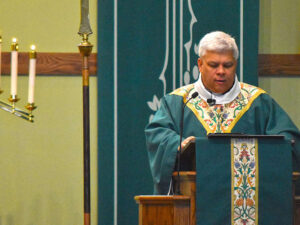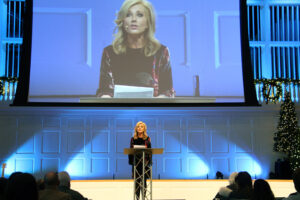Roman Catholic Bishops are fighting back against rising anti-semitism in the West by collaborating with a Jewish advocacy group to release ‘Translate to Hate’, a guide/ manual/ glossary of terms that outlines antisemitic terms, phrases, conspiracies, cartoons, themes, and memes.
A joint venture between the The U.S. Conference of Catholic Bishops (USCCB) and the American Jewish Committee, (AJC) the guide is also annotated by the Committee on Ecumenical and Interreligious Affairs of the U.S. Conference of Catholic Bishops, who agree:
“The scourge of antisemitism shows itself whenever the Jewish people are treated merely as a collective – whether it be racial, ethnic, national, or cultural – that deserves contempt, disparagement, diminishment, or destruction. When this attitude leads an individual or group to mistreat, discriminate against, or harm Jews in speech or act, it is a sin that contradicts Catholic teaching on the unity of the human race and the dignity of all peoples. This commentary draws the attention of Catholic readers to the Church’s teachings relative to these issues and her special regard for the mission God entrusted to Israel for the salvation of all.”
Some of the anti-semetic includes “medieval blood libel claims rooted in Christianity and present-day conspiracy theories about Jewish control of the world economy. It encompasses Holocaust denial and distortion and virulent anti-Israel animus”


Notably, the Bishops include Pepe the frog, explaining that “while the cartoon on its face is not problematic, Pepe the frog has become associated with far-right, antisemitic figures” like “Holocaust denier and peddler of antisemitic content” Nicholas Fuentes.”
They say Pepe serves as a “symbol of the alt-right, namely, the Groyper movement, a group of far-right activists, internet trolls, and white nationalists” and that “its followers, known as the “Groyper Army,” seek to bring white supremacist ideas and content to a mainstream audience.”























6 responses to “The U.S. Conference of Catholic Bishops Officially Disavow the Groypers By Name”
Well, when the SPLC, ADL, RWW, and other such groups embrace sexual immorality, transvestism, and just about every degenerate sin imaginable, and consider those given to such sin to be a protected “collective”, the job is left to the church to stand against the sins of racism and partiality. It’s supposed to be the church’s job in the first place.
But the bishops here have fallen into the same trap, by referencing “any” collective. When it comes to matters of sin, the Bible clearly and distinctly disparages and discriminates against those given to that sin, and does so in no uncertain terms. Such “collectives” formed around and on sin, betray the sin of each individual. So there is no meaningful difference between evaluating individual character versus the group as a whole.
There’s a lot more to it than just individual versus collective. The line, according to scripture, is not thusly drawn. But rather is drawn according to God’s standards of what is sin and what is not, whether there be one or a collective of many. The question is not whether or not any and all imaginable collectives should be disparaged and discriminated against, but rather WHY they may or may not be disparaged and discriminated against. If it is not for a just and right reason, according to God’s word, then it’s wrong and rightly needs to be called out by the church.
Even in scripture, it is not always a matter of sin. In the case of lepers, they were basically kicked out of town. Did Jesus condemn and chastise the townsfolk for not welcoming in the lepers, and for discriminating against the lepers? No, He just healed the lepers. Was the discrimination against the lepers themselves, or against their disease? The same applies to the disease of sin, especially abominable sin.
The Disciples even asked Jesus about whether or not sickness is always the result of sin (John 9:1-3), and He made it clear that such is not always the case. But the point is that when and where we discriminate, and why, is clearly and specifically spelled out in scripture, in detail. As is when and where we shouldn’t. And in the case of Jews vs. Gentiles, God’s word is very clear that we should not. And it is only in instances where we shouldn’t, that we then consider the relevance of individual vs collective.
All churches should be calling out and condemning the racism, and stupid antisemitic fixation on Jews, among the young and stupid the likes of Fuentes. But churches and leaders need to watch their language, otherwise they very well could be feeding, enabling, and justifying the same wickedness and evil they’re apparently trying to stand against. The world sees it as always a matter of individual vs collective in all things, regardless of what defines the collective in question. God’s word certainly does not.
Physical illness is a good example. The Bible says that sometimes illness is the result of sin, or judgment, and sometimes it isn’t. It may in fact be for God’s glory, according to His purposes. So we could very well say it is wrong to collectively judge the physically ill. Well, that would depend on what the judgment is. Right, it is dependent on what defines the group in question. If the subject at hand is quarantining the sick, then it is certainly not wrong to judge the collective defined by that illness as a whole.
In the same manner, if a given collective is defined by sin, then it is not wrong to judge the collective as a whole.
That is not the case with Jews, because it is not a sin to be Jewish. But it does substantiate the fact that the church and leaders, and all of us, need to be careful with our language, and be careful that we’re sticking to God’s standards and not the standards of the wicked world. As they all will collectively discriminate by some definitions of imaginable collectives and categorizations, the only difference is that they discriminate based on their own contrived standards, rather than God’s standards. I.e., what they call wrong, not what God calls wrong. So one cannot possibly say it is never right to collectively judge without making himself a hypocrite. The statement itself collectively judges. No, the line is drawn where God drew and forever set the line.
Of course, since the US Council of Catholic Bishops is getting rich as coyotes importing illegal alien filth.
Fuentes and the Groypers have made themselves obnoxious and don’t seem to have any sincere desires to in doing the Lords will. They fixate on a tiring subject that isn’t conducive to love, mercy or peace. If this helps give them time to reflect on their hearts, all the more glory for God.
In other words you’re antiwhite trash who like the Jews wants whites replaced and banned from having job. You’re going to hell. You are not a Christian.
[…] hardline American nationalism, hatred of Jews, and an idiosyncratic Catholicism which has been officially denounced by American bishops, while cultivating an aesthetic blend of twink homosexuality, pedophilic anime tropes, and […]